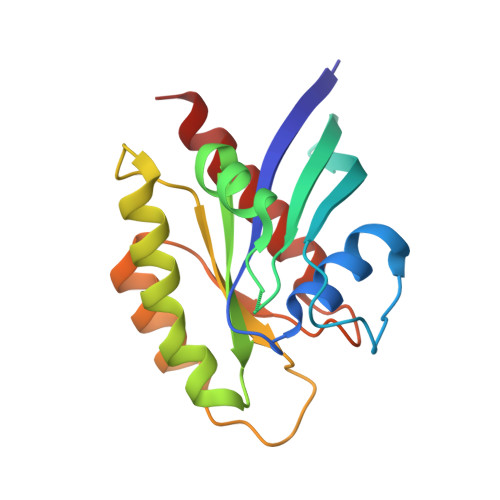Ras Binder Induces a Modified Switch-II Pocket in GTP and GDP States.
Gentile, D.R., Rathinaswamy, M.K., Jenkins, M.L., Moss, S.M., Siempelkamp, B.D., Renslo, A.R., Burke, J.E., Shokat, K.M.(2017) Cell Chem Biol 24: 1455-1466.e14
- PubMed: 29033317
- DOI: https://doi.org/10.1016/j.chembiol.2017.08.025
- Primary Citation of Related Structures:
5VBE, 5VBM, 5VBZ - PubMed Abstract:
Covalent inhibitors of K-Ras(G12C) have been reported that exclusively recognize the GDP state. Here, we utilize disulfide tethering of a non-natural cysteine (K-Ras(M72C)) to identify a new switch-II pocket (S-IIP) binding ligand (2C07) that engages the active GTP state. Co-crystal structures of 2C07 bound to H-Ras(M72C) reveal binding in a cryptic groove we term S-IIG. In the GppNHp state, 2C07 binding to a modified S-IIP pushes switch I away from the nucleotide, breaking the network of polar contacts essential for adopting the canonical GTP state. Biochemical studies show that 2C07 alters nucleotide preference and inhibits SOS binding and catalyzed nucleotide exchange. 2C07 was converted to irreversible covalent analogs, which target both nucleotide states, inhibit PI3K activation in vitro, and function as occupancy probes to detect reversible engagement in competition assays. Targeting both nucleotide states opens the possibility of inhibiting oncogenic mutants of Ras, which exist predominantly in the GTP state in cells.
- Department of Cellular and Molecular Pharmacology, Howard Hughes Medical Institute, University of California, San Francisco, CA 94158, USA.
Organizational Affiliation:



















